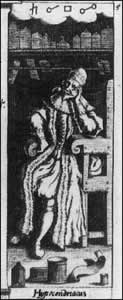
Melancholy as Ethical Vice
 |
At the head of the hierarchy of sins held by the Elizabethan religious orthodoxy lies the sin of despair. Despair represents a refusal or inability to enter into relationship with God, and, as a result, a distancing from God's grace. Whether feigned or genuine (and probably somewhere in between), Hamlet's melancholy causes him to distrust his first inclinations toward the apparition he has encountered, and to test them through the device of the mousetrap scene. In effect, he accepts the popular belief that the Devil considers melancholiacs to be ripe for deception - a belief which looks suspiciously upon melancholy and considers it to be a possible reflection of moral or ethical lapses.
|
Sadness, or Heaviness of heart Sadness is a languishing feebleness of the spirit, and a kinde of discouragement
engendered by the opinion that we have of the greatness of those evils
that afflict us. It is a dangerous enemie to our rest, which presently
weakeneth and quelleth our soules, if we take not good heede, and taketh
from us the use of reason and discourse, and means whereby to provide
for our affaires, and with time it rusteth ... the soul, it corrupteth
the whole man, brings his virtues asleepe, even then when he hath most
need to keepe them awake, to withstand that evil which oppresseth them:
but we must discover the foulness and follie, the pernicious effects,
yea the injustice that is in this cowardly, base, and feeble passion,
to the end wee may learne with all our might to flie and avoid it, as
most unworthy the wisest men, according to the doctrine of the Stoicks... |